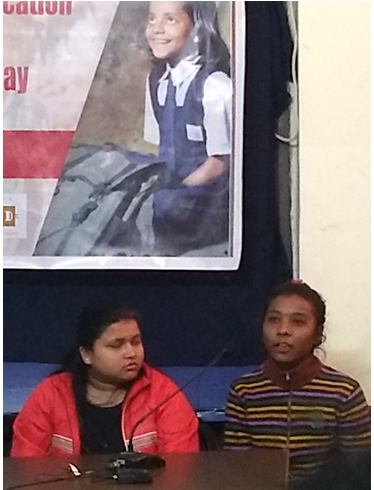
“They kicked me out of school because I failed twice, they did not care that I had just lost my mother,” said Madhu, who is on her way to resume education after struggling with her school.
On the 12th National Girl Child Day and the 1st International Day of Education, the status of girls’ education in India appears bleak. Addressing the press conference, Mr. Ambarish Rai, National Convener, Right to Education Forum (RTE Forum) said, “It’s imperative to know where the girls in India stand today after more than seven decades of being a free country. Situation is very pathetic on the ground. Girls are deprived of all of their fundamental rights, particularly education. We all have heard the drum beating of ‘Beti Bachao, Beti Padhao’ by the government. But it is the government which has failed this programme. The total budget of this programme was Rs. 100 crore. And we know the news that approximately 60 per cent of this fund has been wasted on just publicity. The remaining 40 crores is just a farce and inadequate to provide education to the girls of this country.”
Even after nearly nine years of the implementation of the Right to Education (RTE) Act, millions of girls are still out of school because of various reasons like the absence of female teachers, lack of separate toilets, lack of safety and security within and outside the schools. Only 12 per cent schools in India are compliant with the RTE Act. On the top of this, under the pretext of rationalisation, nearly 2 lakh schools have been closed down.
Mr. Ashok Kumar of Campaign against Child Labour and Alliance for the Right to Early Childhood Development, in his address, said, “There were 972 women per 1000 men in 1901 and now this figure has slipped to 940 women per 1000 men in 2011. The question is where are the missing numbers? The global average of female literacy rate is 79.7 per cent, whereas in India, this figure is 65.46 per cent. In Kerala, the female literacy rate is 92.07 per cent whereas in Bihar it is as low as 51.5 per cent. This kind of disparity and slackness is the real bottleneck in the betterment of girls.”
Speakers at the conference also pointed out that 27 per cent girls are married before reaching their 18th birthday. More than one third of adolescent girls in India are subjected to varied degree of sexual abuse including rape. They also questioned if we can justify our claim to be the world’s fastest growing economy.
During the conference, the leaders of three networks demanded complete implementation of the RTE Act, extension of the act to include all children from birth to 18 years of age, strengthening of the public education system and increased investment in girls’ education as the way forward to universalise girls’ access to free, safe and quality education.
Girls from different communities across Delhi NCR joined the discussion to share about the barriers they face in accessing quality and equitable education. Students along with School Management Committee (SMC) members mentioned different hurdles. Kalavati, a member of an SMC said, “There are so many obstacles to the education of girls in this country, she questioned, “Beti Bachani hai, toh beti padhayein kaise hum? (If we have to save our daughters, then how do we educate them?).”




